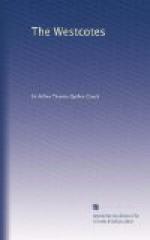“The voice was shaky and, I dare say, uncertain in its upper notes; but it fetched M. Benest right-about-face again. He perceived that it came from the garden of a solitary cottage up the road, a gunshot and more beyond his signpost. But a tall hedge interrupted his view, and, though he stared long and earnestly, all he could see that day was a pea-stick nodding above it.
“He came again, however,—not the next day, but the day after,—and was rewarded by a glimpse of a white cap with bows which seemed at that distance of a purplish colour. Its wearer was standing in the gateway and exchanging a word with the Rector, who had reined up his horse in the road.
“M. Benest walked home and made inquiries; but his landlady could only tell him that the cottage was rented by two ladies, sisters,—she had heard that they came from the West Indies,—who saw nobody, but wished only to be let alone. One of them, who suffered from an incurable complaint, was never seen; the other could be seen on fine days in her garden, where she worked vigorously; and what the pair lived on was a mystery, for they bought nothing in the town or of their neighbours.
“On learning this, M. Benest became very cunning indeed. He bought a fishing rod.
“For I ought to have told you that a stream ran down the valley beside the road, and it contained trout—perhaps as many as a dozen. M. Benest had no desire to catch them; but, you see, he was forced to acquire some show of expertness in order to deceive the wayfarers who paused and watched him; and in time (I am told) the fish, after being unhooked once or twice and restored apologetically to the water, came to enjoy disconcerting him. You must understand that he had no foolish illusions concerning the white cap and purplish ribbons—the Mademoiselle Henriette, as he discovered she was called. He only knew that here were two women, his compatriots, poor certainly, often hungry perhaps, shipwrecked so close to him upon this corner of (pardon me, Miss Dorothea) an unfriendly land, yet divided from any comfort he could bring by fifty yards of road and his word of honour. She must be of the true blood of France who quavered out Vive Henri Quatre so resolutely over her digging and hoeing: but the sound of a French voice might hearten her as hers had heartened him. Therefore he sang lustily while he angled—which is not good for sport; and when he caught a fish, broke into paeans addressed less to the captive—with which, between you and me, he was secretly annoyed—than to an ear unseen, perhaps a quarter of a mile away.
“But there came a day—how shall I tell it?—when calamity fell upon the cottage. For some time the farmers up the valley had been missing sheep. What so easy now as to suspect the two women who were never known to buy either bread or butcher’s meat? You can guess! A rabble marched up from the town and broke in upon them. It found nothing, of course; and I am told that at sight of the face of the poor elder sister it fled back in panic, leaving the place a wreck.




